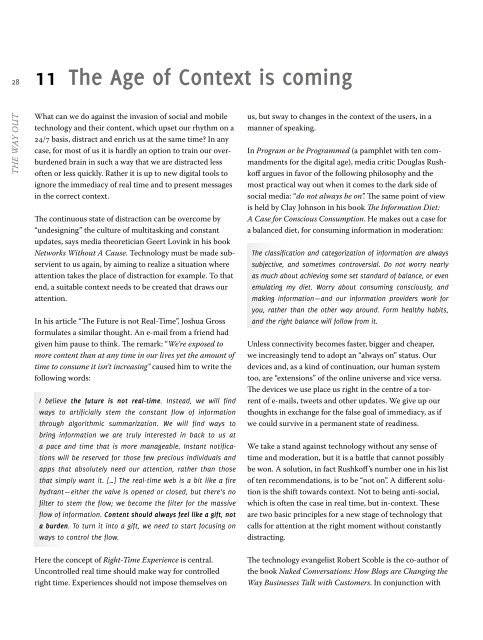VINT-The-Dark-Side-of-Social-Media-Alarm-Bells-Analysis-and-the-Way-Out
VINT-The-Dark-Side-of-Social-Media-Alarm-Bells-Analysis-and-the-Way-Out
VINT-The-Dark-Side-of-Social-Media-Alarm-Bells-Analysis-and-the-Way-Out
Create successful ePaper yourself
Turn your PDF publications into a flip-book with our unique Google optimized e-Paper software.
28<br />
<strong>the</strong> WaY oUt<br />
11 <strong>The</strong> Age <strong>of</strong> Context is coming<br />
What can we do against <strong>the</strong> invasion <strong>of</strong> social <strong>and</strong> mobile<br />
technology <strong>and</strong> <strong>the</strong>ir content, which upset our rhythm on a<br />
24/7 basis, distract <strong>and</strong> enrich us at <strong>the</strong> same time? In any<br />
case, for most <strong>of</strong> us it is hardly an option to train our overburdened<br />
brain in such a way that we are distracted less<br />
<strong>of</strong>ten or less quickly. Ra<strong>the</strong>r it is up to new digital tools to<br />
ignore <strong>the</strong> immediacy <strong>of</strong> real time <strong>and</strong> to present messages<br />
in <strong>the</strong> correct context.<br />
<strong>The</strong> continuous state <strong>of</strong> distraction can be overcome by<br />
“undesigning” <strong>the</strong> culture <strong>of</strong> multitasking <strong>and</strong> constant<br />
updates, says media <strong>the</strong>oretician Geert Lovink in his book<br />
Networks Without A Cause. Technology must be made subservient<br />
to us again, by aiming to realize a situation where<br />
attention takes <strong>the</strong> place <strong>of</strong> distraction for example. To that<br />
end, a suitable context needs to be created that draws our<br />
attention.<br />
In his article “<strong>The</strong> Future is not Real-Time”, Joshua Gross<br />
formulates a similar thought. An e-mail from a friend had<br />
given him pause to think. <strong>The</strong> remark: “We’re exposed to<br />
more content than at any time in our lives yet <strong>the</strong> amount <strong>of</strong><br />
time to consume it isn’t increasing” caused him to write <strong>the</strong><br />
following words:<br />
I believe <strong>the</strong> future is not real-time. Instead, we will find<br />
ways to artificially stem <strong>the</strong> constant flow <strong>of</strong> information<br />
through algorithmic summarization. We will find ways to<br />
bring information we are truly interested in back to us at<br />
a pace <strong>and</strong> time that is more manageable. Instant notifications<br />
will be reserved for those few precious individuals <strong>and</strong><br />
apps that absolutely need our attention, ra<strong>the</strong>r than those<br />
that simply want it. […] <strong>The</strong> real-time web is a bit like a fire<br />
hydrant — ei<strong>the</strong>r <strong>the</strong> valve is opened or closed, but <strong>the</strong>re’s no<br />
filter to stem <strong>the</strong> flow; we become <strong>the</strong> filter for <strong>the</strong> massive<br />
flow <strong>of</strong> information. Content should always feel like a gift, not<br />
a burden. To turn it into a gift, we need to start focusing on<br />
ways to control <strong>the</strong> flow.<br />
Here <strong>the</strong> concept <strong>of</strong> Right-Time Experience is central.<br />
Uncontrolled real time should make way for controlled<br />
right time. Experiences should not impose <strong>the</strong>mselves on<br />
us, but sway to changes in <strong>the</strong> context <strong>of</strong> <strong>the</strong> users, in a<br />
manner <strong>of</strong> speaking.<br />
In Program or be Programmed (a pamphlet with ten comm<strong>and</strong>ments<br />
for <strong>the</strong> digital age), media critic Douglas Rushk<strong>of</strong>f<br />
argues in favor <strong>of</strong> <strong>the</strong> following philosophy <strong>and</strong> <strong>the</strong><br />
most practical way out when it comes to <strong>the</strong> dark side <strong>of</strong><br />
social media: “do not always be on”. <strong>The</strong> same point <strong>of</strong> view<br />
is held by Clay Johnson in his book <strong>The</strong> Information Diet:<br />
A Case for Conscious Consumption. He makes out a case for<br />
a balanced diet, for consuming information in moderation:<br />
<strong>The</strong> classification <strong>and</strong> categorization <strong>of</strong> information are always<br />
subjective, <strong>and</strong> sometimes controversial. Do not worry nearly<br />
as much about achieving some set st<strong>and</strong>ard <strong>of</strong> balance, or even<br />
emulating my diet. Worry about consuming consciously, <strong>and</strong><br />
making information — <strong>and</strong> our information providers work for<br />
you, ra<strong>the</strong>r than <strong>the</strong> o<strong>the</strong>r way around. Form healthy habits,<br />
<strong>and</strong> <strong>the</strong> right balance will follow from it.<br />
Unless connectivity becomes faster, bigger <strong>and</strong> cheaper,<br />
we increasingly tend to adopt an “always on” status. Our<br />
devices <strong>and</strong>, as a kind <strong>of</strong> continuation, our human system<br />
too, are “extensions” <strong>of</strong> <strong>the</strong> online universe <strong>and</strong> vice versa.<br />
<strong>The</strong> devices we use place us right in <strong>the</strong> centre <strong>of</strong> a torrent<br />
<strong>of</strong> e-mails, tweets <strong>and</strong> o<strong>the</strong>r updates. We give up our<br />
thoughts in exchange for <strong>the</strong> false goal <strong>of</strong> immediacy, as if<br />
we could survive in a permanent state <strong>of</strong> readiness.<br />
We take a st<strong>and</strong> against technology without any sense <strong>of</strong><br />
time <strong>and</strong> moderation, but it is a battle that cannot possibly<br />
be won. A solution, in fact Rushk<strong>of</strong>f’s number one in his list<br />
<strong>of</strong> ten recommendations, is to be “not on”. A different solution<br />
is <strong>the</strong> shift towards context. Not to being anti-social,<br />
which is <strong>of</strong>ten <strong>the</strong> case in real time, but in-context. <strong>The</strong>se<br />
are two basic principles for a new stage <strong>of</strong> technology that<br />
calls for attention at <strong>the</strong> right moment without constantly<br />
distracting.<br />
<strong>The</strong> technology evangelist Robert Scoble is <strong>the</strong> co-author <strong>of</strong><br />
<strong>the</strong> book Naked Conversations: How Blogs are Changing <strong>the</strong><br />
<strong>Way</strong> Businesses Talk with Customers. In conjunction with


